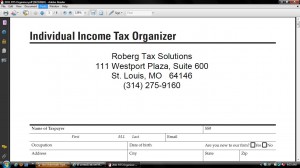
Photo by Lancashire County Council on Flickr.com
If you’ve started a new business and you filed the Articles of Organization in your state to become an LLC, then here are some things you need to know about filing taxes for your new company.
First, there is no such thing as an LLC tax return. I know that sounds crazy, but it’s true. Every year, thousands of people walk into their accountants’ offices and say, “I want to file an LLC tax return!” This is what accountants joke about at their conventions and at the water cooler. We even post silly You Tube videos about it. This post is to help you not be the butt of some dumb accounting joke.
An LLC is a Limited Liability Company. One of the most common mistakes people make is that they think LLC means “Corporation”, it doesn’t. If you have an LLC, you probably are not going to file a corporation return (although you might, I’ll discuss that later).
The IRS considers an LLC to be something they call a “disregarded entity.” That means that it doesn’t have a specific tax document that goes with it. If your LLC only has one “member” (member is LLC-speak for owner) then the default tax return for your LLC is a Schedule C which is part of your 1040 income tax return. It’s due on April 15th just like any other individual tax return.
If your LLC has two or more members, then by default you are considered to be a partnership and you must file a partnership return, form 1065. Form 1065 is due on April 15th also, but it’s a good idea to get it done sooner because the information on the 1065 needs to go onto your personal tax return before you file it. When your accountant prepares the 1065, she’ll also prepare a K-1 form that will be used to prepare your personal income tax return.
So, if you have an LLC, the default tax return you might file would be a Schedule C as part of your individual income tax return, or a 1065 partnership return (and you’d receive a K1 form so you could put your partnership income on your personal tax return).
Instead of using the default filing options, you can choose to have your LLC treated as an S corporation or a C corporation for income tax purposes. It’s very rare to choose to have your LLC treated as a C corporation. Usually, if a person wanted to pay corporation tax rates, she would file articles of incorporation to begin with. But one advantage to filing as an LLC and then electing to be taxed as a C corporation would be to avoid some of the stringent reporting and meeting requirements that C corporations have. Usually, it’s not advantageous tax-wise to be treated as a C-Corporation, but there are always some exceptions. If you do go this route, you will need to file an election to be taxed as a corporation: form 8832. The tax return for a C-Corporation is called an 1120. You must file the 1120 or the extension by March 15th or you will be assessed a late filing penalty even if you owe no tax. A C-Corporation pays taxes on its income and pays wages and/or dividends to the owner.
The more common corporate tax treatment for LLCs is to be taxed as an S Corporation. A Sub-chapter S corporation passes its profits through to the owner. If you elect to be a Sub S Corporation, you must pay yourself a wage. For most businesses, the purpose behind a Sub-chapter S corporation is to avoid paying self-employment taxes. There are two things you must know:
1. A Sub S Corporation isn’t always the best way to avoid paying self-employment taxes and,
2. You’re not allowed to say that you’re trying to avoid paying self-employment taxes, even though that’s pretty much the reason anybody ever makes the Sub S election.
To make the election to be taxed as a Sub S Corporation, you will need to file form 2553. A Sub S Corporation tax return is called an 1120S form and it is due by March 15th. The S corp does not pay income tax; the income from the S corp will be reported on a K1 and will flow through to your personal tax return.
If you make an election to be taxed as a C or an S Corp, you will have to keep that designation for at least five years unless you get special permission from the IRS to change. You want to make sure you really want to make the election for corporate tax treatment before filing those forms.
Here’s my really important tax advice: Assume that you’re filing your LLC return either as a Schedule C (sole proprietor) if you’re a solo owner, or a 1065 partnership return if you have more than one owner, at least for the first year. But then, sit down with your preparer and run the numbers all three ways, (Schedule C, S-Corp, C-Corp) to see what makes the most sense for your business. Make some projections about your future income and expenses and take into account the deductions that you may have missed last year but won’t miss again. Smart planning can save you thousands of dollars in taxes over the years to come. Saving on taxes helps your business grow and puts money in your pocket.









